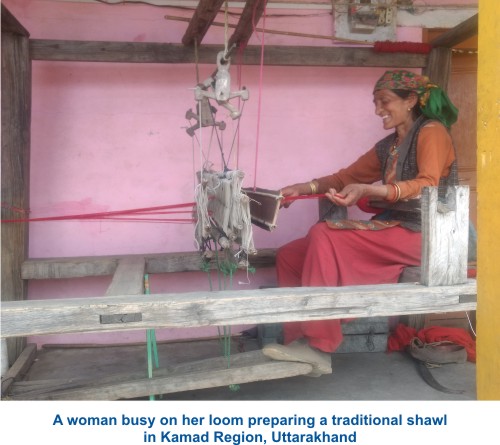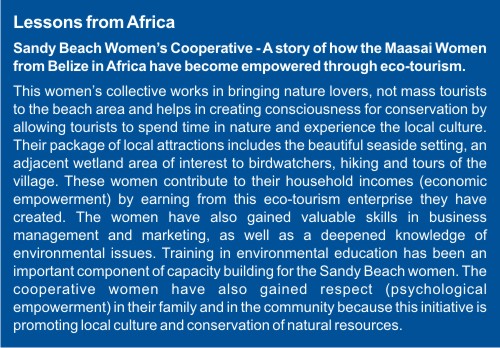|
Empowering Women through
Eco-Tourism All Ceballos-Lascurain (1996) suggests that eco-tourism is environmentally responsible, enlightening travel and visitation to relatively undisturbed natural areas in order to enjoy and appreciate nature (and any accompanying cultural features both past and present) that promotes conservation, has low visitor impact, and provides for beneficially active socio-economic involvement of local populations”.
Very recently, I visited an eco-tourism site
in Assam, India, where women were involved but not beyond hospitality
services. After seeing their passive involvement in decision making
processes, my concerns were the same as they were thirteen years ago
when I started researching on eco-feminism. From a development
perspective, many eco-tourism ventures have progressed in these thirteen
years with inadequate regard to the changes that could be brought about
in gender roles and access of women to natural, economic and social
resources. From the limited literature on women in eco-tourism, we found
that it runs the risk of disadvantaging and marginalising local women
from the development process.
Biggest challenge is that, the current
eco-tourism projects are not venturing into further opportunities that
can be created for women. There is also lack of research on how women
could provide better results by providing specialist knowledge and
skills on natural resource management. Most of the projects give
emphasis on creating jobs for tour guides which is not that comfortable
for rural women to do. Here, the greatest concern is that women may miss
out from the overall decision making process in eco-tourism projects
which may lead to poorly managed eco-tourism programmes not giving
enough importance on sustainable natural resource management as it is
the women who have a deep concern for the sustainable use of the natural
resource base which can actually benefit eco-tourism activities . Involvement of women in eco-tourism for empowerment
In recent years, eco-feminist groups and
environmental research groups have given emphasis on gendered analysis
in tourism research. However, the impacts of eco-tourism as an
alternative form of tourism and its potential impacts on women has
rarely been studied. There is an urgent need to relook at social
dimensions of eco-tourism. For instance,
Why
should any agency which promotes eco-tourism give importance in bringing
women as active agents for eco-tourism? For answering that we need to go deeper into our social system and caste, class and gender roles. If we look at the reasons why women can play active roles and how, there are a number of reasons. In a country like India, especially in fragile ecosystems, women and girls play greater roles and interaction with the natural environment than their male counterparts. Therefore, women’s cooperation is needed to create a base for eco-tourism and community development work. Also if we look at migration data across all the states of India, the male population usually migrates in search of better livelihoods in urban areas. Women, children and old age people are left behind. Women acquire special knowledge by spending time and creating a special bond with the natural environment. But if we look at the eco-tourism initiatives, planning and decision making parts are taken care of by male members. This has to change. We need to bring more women to this space of eco-tourism where women can share active roles in the development processes. Women can play an important role in ensuring good natural resource management which protects key resources upon which eco-tourism is based. As mentioned earlier, eco-tourism promotes empowerment of the local community and empowerment can be seen in four aspects – economic, social, political and psychological. To understand these four aspects, we need to understand first whether a community has control over an eco-tourism initiative or not. If the venture provides opportunities for developing new skill sets, confidence, self-esteem, respect that is psychological empowerment and if it enhances social cohesion among communities that is social empowerment and if it has created many jobs and livelihood options for all the community members then that is economic empowerment. A good eco-tourism project cannot overlook all of these four dimensions of development and cannot ignore active involvement of women. If we look at the Himalayan states, where eco-tourism is flourishing, women and girls are most connected with nature and natural resources. They are the ones who have been involved in income generation activities based on forest and forest products. In many parts, the women and girls are the ones who have been involved in creating crafts and craft products, medicines, natural herbs, etc. Women’s collectives as decision making agencies Economic empowerment through collective decision-making processes can enhance skills and build capacities of women as a group. As a women’s collective, they can work together to challenge existing gender roles and supplement and enhance their family income. The women can promote local culture, conserve natural resources, sell craft products by selling local food, can perform local cultural songs and dance without travelling to other locations as there are restrictions on women’s mobility across Indian societies. In this way, they can retain their hold over management of the eco-tourism industry. Eco-tourism can provide sense of self pride in local women Women are very optimistic and have faith in local traditions and culture. By providing livelihoods to women in which they are involved in promoting local culture and tradition, women feel quite satisfied. For example, The Mountain Institute in Himalayan region promotes participation of women in all their activities, including conducting workshops on local culture, study tour, etc. It is concluded that community participation is a must for eco-tourism development. Women should be encouraged to get involved in such initiatives in decision making roles to organise and manage sustainable eco-tourism projects. ■
Nibedita Phukan
References: |

